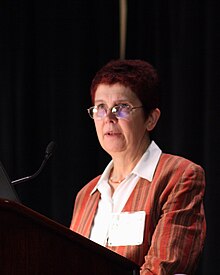Mary Susanna Morgan FBA FRDAAS, is an economist, philosopher, historian, and the Albert O. Hirschman Professor of the History and Philosophy of Economics in the London School of Economics. She was Department Chair of Economic History between 2002 and 2005. In 2002, she was elected a Fellow of the British Academy.

Biography
editMorgan graduated from the London School of Economics a Bachelor of Science (BSc) in economics in 1978 and a Doctor of Philosophy (PhD) in 1984.[1][2] From 1992 to 2002, she worked part-time as Professor of the History and Methodology of Economics in the University of Amsterdam.[1][2] Since 2002, she has been an overseas member of the Royal Netherlands Academy of Arts and Sciences.[3]
Her most informative period occurred during her PhD, when she was working on the history of econometrics. At the time, she was part of a research group at the ZiF in Bielefeld on 'The Probabilistic Revolution' — a historical and philosophical project in part led by Ian Hacking. That was a time when philosophers of economics were mainly inside economics departments, not in the philosophy of science community.[4]
Research
editMorgan has made important contributions to the history of economic thought, especially with regard to the history of econometrics, the historical development of measurement in economics, and the evolution and methodological implications of the use of economic models (see important publications list).[citation needed] She is influential in bridging philosophy of economics with philosophy of science, asking how economists work and think.[4] Her philosophical work focuses on the role of narratives, evidence, case studies, and models in economics and the social sciences. As a historian of science, she interrogates how these have changed over the past century.
She led a major European Commission European Research Council Advanced Investigator Grant titled "Narrative in Science" (2016-2020).[5] Other grants included the project "Re-thinking Case Studies Across the Social Sciences" (2009-2012),[6] "The Nature of Evidence: How Well Do "Facts" Travel?" (2004-2009),[7] and "Models and Their Making in Economics" (1999-2001).[8] Her book The World in the Model (Cambridge University Press, 2012) on the history and philosophy of economics explains how economists use models and economics as a model-based science.[9]
Most important publications
edit- The History of Econometric Ideas, 1990. ISBN 0-521-42465-8
- The Foundations of Econometric Analysis (with D. F. Hendry), 1995. ISBN 0-521-38043-X
- Models as Mediators (ed. with M. Morrison), 1999.
- The Age of Economic Measurement (ed. with Judy L. Klein), 2001 (History of Political Economy, Annual Supplement to Vol. 33). ISBN 0822365170
- The World in the Model: How Economists Work and Think, 2012. ISBN 978-1-107-00297-5
External links
editReferences
edit- ^ a b "Prof Mary S. Morgan". London School of Economics. Archived from the original on January 2, 2007. Retrieved March 18, 2007.
- ^ a b "Curriculum Vitae 'Mary Susanna Morgan' 2004" (PDF). November 4, 2004. Archived from the original (PDF) on January 2, 2007.
- ^ "Mary Morgan" (in Dutch). Royal Netherlands Academy of Arts and Sciences. Retrieved 15 July 2015.
- ^ a b "Women in Philosophy of Science. Thee-minute interview with Mary S. Morgan".
- ^ "Narrative Ordering and Explanation in the Sciences: Historical Investigations and Perspectives".
- ^ "Wolfson Research Professorships Awards 2009". The British Academy. Retrieved 2020-11-29.
- ^ "How well do facts travel?". London School of Economics and Political Science. Retrieved 2020-11-29.
- ^ "British Academy Research Readerships: past awards". The British Academy. Retrieved 2020-11-29.
- ^ Morgan, Mary S. (2012). The world in the model : how economists work and think. Cambridge: Cambridge University Press. ISBN 978-1-139-54925-7. OCLC 808366388.